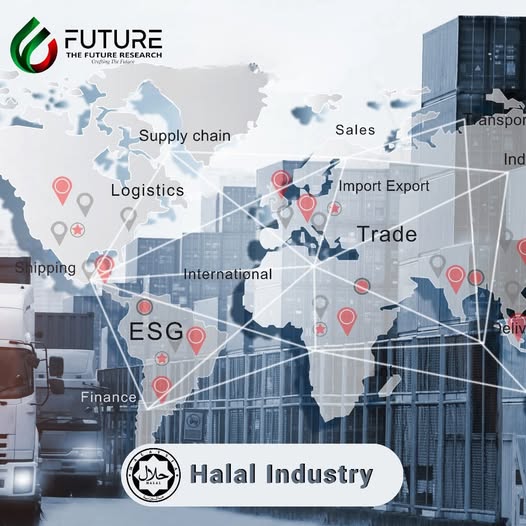The Future Research (TFR) extends its gratitude for the opportunity to participate in the National Halal Transformation Conference, alongside the Islamic Chamber of Commerce Malaysia. This conference provided a vital platform for industry leaders and stakeholders to engage in meaningful discussions about the future of the Halal sector.
Within the framework of the “National Halal Policy” cluster, we presented several key recommendations aimed at elevating the Halal industry in Malaysia and globally.
One of the primary recommendations made is the optimization of frontier technologies in all Halal-related activities. In an era defined by rapid technological and digitalisation advancement, it is crucial that the Halal sector embraces innovations such as artificial intelligence, blockchain, and the Internet of Things (IoT). These technologies can significantly enhance transparency and traceability within the Halal supply chain, ensuring that products meet stringent Halal standards from production to consumption. For instance, blockchain technology can provide an immutable ledger that tracks each step of the supply chain, allowing consumers to verify the Halal status of products effortlessly. By adopting such technologies, the industry can foster greater consumer trust and confidence in Halal products.
It was further emphasized of the importance of government leadership in this endeavor. It is vital for the Malaysian government, through all its ministries and agencies, to champion Halal certification as a prerequisite for contract awards in relevant sectors. By making Halal certification a standard requirement for government contracts, the government can encourage businesses owner and contractors to pursue rigorous certification processes. This initiative not only elevates the status of Halal products but also ensures that public resources are directed towards companies committed to upholding Halal standards. Ultimately, this approach fosters a competitive environment where quality and compliance are paramount.
In addition to local initiatives, it is pertinent for the need of a robust international strategy through “Halal Diplomacy.
Malaysia’s role as a leader in the Halal market must be complemented by active engagement in international organizations such as ASEAN, BRICS, and various bilateral and multilateral agreements. By promoting Halal as a global standard, Malaysia can enhance its economic influence and open new markets for its Halal offerings. This diplomatic approach can also facilitate collaboration with other nations that recognize the value of Halal products, fostering a more interconnected global Halal ecosystem.
TFR recognizes the importance of integrating Environmental, Social, and Governance (ESG) principles into Halal practices across all sectors. As consumers increasingly prioritize sustainability and ethical considerations, aligning Halal certification with ESG standards can significantly enhance the appeal of Halal products.
Encouraging businesses to adopt ESG frameworks will ensure that Halal products not only comply with religious requirements but also contribute positively to society and the environment simultaneously drive exports to countries that has ESG compliances requirements for their imports.
This holistic approach can attract a broader consumer base, including those who may not identify as Muslim but value ethical and sustainable practices in their purchasing decisions.
Another critical area identified and highlighted is the enhancement of professionalism within the Halal sector through Technical and Vocational Education and Training (TVET).
Developing a skilled workforce that is both ethical and competent is essential for the future growth of the industry. We should advocate for educational initiatives that align with the needs of the Halal sector, ensuring that future professionals are well-equipped to navigate the complexities of a rapidly evolving market. By fostering a culture of continuous learning and professional development, the Halal industry can attract talent that is not only knowledgeable but also committed to maintaining high standards of Halal compliance.
In light of these recommendations, TFR emphasizes the need for a comprehensive National Halal Policy that addresses all critical aspects of the industry. While only one of the recommendations made during the conference was highlighted in the plenary session, it is essential to recognize that each of these initiatives plays a crucial role in shaping the future of the Halal sector.
Continued dialogue among industry stakeholders, government agencies, and educational institutions is necessary to build a cohesive strategy that promotes sustainable growth and global competitiveness.
Additionally, TFR applauded the establishment of a collaborative platform where industry stakeholders can share best practices and innovations related to Halal compliance. Such a platform would facilitate knowledge exchange and foster a sense of community among businesses, researchers, and policymakers. By working together, stakeholders can identify common challenges and develop collective solutions that enhance the Halal ecosystem.
The future of the Halal industry hinges on our ability to adapt to changing market dynamics and consumer expectations. By embracing technological advancements, fostering international collaboration, integrating ESG principles, and investing in human capital, Malaysia can position itself as a global leader in the Halal sector. TFR believes that a comprehensive approach to the National Halal Policy will not only benefit businesses but also strengthen Malaysia’s economic standing on the world stage.
As we move forward, it is essential to remain committed to these initiatives and continuously assess their impact on the Halal industry. TFR calls on all stakeholders to join in this effort to create a vibrant, innovative, and ethically sound Halal sector that can thrive in an increasingly competitive global market. Through collaboration, dedication, and a shared vision, we can ensure that Malaysia’s Halal industry not only meets the demands of today but also sets the standard for future generations.
TFR looks forward to engaging with all stakeholders to further refine and implement these recommendations, ensuring the sustained growth and global competitiveness of Malaysia’s Halal industry. Together, we can shape a future where Halal products are synonymous with quality, integrity, and social responsibility.
Mohd Roslan Saludin
Research Fellow
The Future Research


Leave a Reply